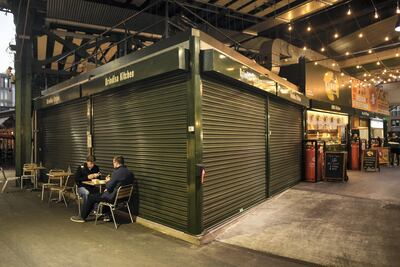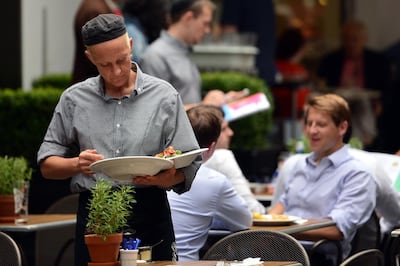England’s hospitality sector will receive a £314 million ($430.28m) boost in the first week after the reopening of the country’s restaurants, cafes and pubs as the third national lockdown continues to ease.
The cash injection will mark the end of more than three months of closed doors for England's hospitality venues, which can reopen for outdoor service from Monday.
“There is a palpable sense of excitement surrounding hospitality reopening, seemingly even more so than was the case after the previous two national lockdowns,” said Nina Skero, chief executive of the Centre for Economics and Business Research.
“One possible reason for the added enthusiasm is the belief held by many that thanks to the strong vaccine campaign, there won’t be another lockdown. All these factors currently work together to lift consumer sentiment to levels well beyond those seen over much of 2020.”
Consumer confidence increased in February, reaching 106.4, the YouGov/Cebr Consumer Confidence Index said, a rise of 3 points, which represents the largest increase since June 2020.
The improvement came as the government announced its roadmap out of lockdown, outlining the dates at which particular restrictions would be loosened.
Before the outbreak of the pandemic, hospitality was the third largest employer in the country, providing jobs for 3.2 million people and creating £130bn in economic activity, trade body UK Hospitality said.
The sector generated £39bn of tax for the government, funding vital services and making it key to Britain’s economic recovery.
Cebr said households spent £663m a week on dining out before the crisis started, however, in recent months this figure dropped to zero except for takeaways, which are excluded from Cebr’s analysis.
This gloomy picture is expected to change from Monday, with 39 per cent of venues able to take advantage of the reopening as they have access some kind of outdoor space for customers, according to the Market Recovery Monitor by CGA and AlixPartners.
Firms plan to use gardens, terraces, car parks and other areas to seat guests and cash in on the easing of restrictions.
While Ms Skero said the £314m boost to the hospitality sector was only a fraction of the normal pre-pandemic levels, it would still provide a welcome boost to one of the country’s most impacted sectors.
Looking back at the past two lockdowns, in the first week after lockdown one, which ended on July 4, diner numbers rebounded to 33 per cent of pre-pandemic levels, according to OpenTable, which tracks seated diners from online, phone and walk-in bookings.
In the first week after lockdown two, which ended on December 2, the rebound was stronger with levels at 56 per cent of the pre-pandemic norm.
“With more than half of the population at least partially vaccinated, optimism at record highs and a good amount of cash savings and pent-up demand, there are many reasons to believe that demand for restaurants and pubs will rebound even stronger than after the previous two reopenings,” Ms Skero said.
“There is no question, however, that everyone will be keenly awaiting the confirmation that indoor hospitality will be allowed to resume from May 17, enabling many more venues to reopen and increase capacity."

Britain's economic output plunged 9.9 per cent last year, in its worst contraction in more than 300 years, after the country's businesses, schools, non-essential shops and hospitality venues were closed during lockdowns.
Paul Dales, chief UK economist at Capital Economics, said even before non-essential retailers, hairdressers and outside hospitality venues reopen on Monday, there were mounting signs that the effects of the third Covid-19 lockdown on the economy have started to thaw, with companies also starting to hire again.
"We are sticking to our relatively optimistic view that the reopening of the economy and the vaccine programme will allow gross domestic product)to regain its pre-pandemic level early next year," Mr Dales said.
"While employment may yet fall further between now and the end of the year (not least as the furlough scheme ends in September), our GDP forecasts suggest that employment is not far from a trough and will start to rise late this year."
Last summer, Britain's government spent almost twice as much as expected on encouraging people to eat in restaurants, cafes and pubs during the temporary lull in Covid-19 cases in August.
UK Finance Minister Rishi Sunak's Eat Out to Help Out scheme cost £849m, much more than an initial government estimate of £500m.



